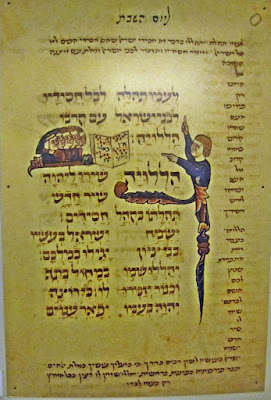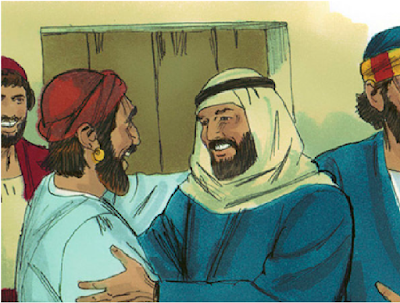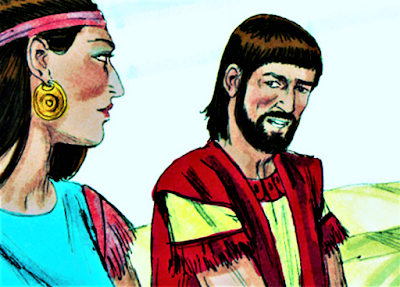Go Deeper: We Can Praise God
Our preschoolers are learning that God is good! In our Bible story "We Can Praise God," we learn
that we can praise God for who He is, what He has done, and what He continues
to do for us. And here, go deeper. Let's dive in!
First, look at
this image. It is a 13th-century French manuscript of Psalm 149. This psalm is
the focus of our Bible story and the subject of our discussion here. Now,
onward.
Let’s start with that first
phrase of the psalm. In older English translations of the Bible, it is
translated as “praise ye the LORD,” and in newer translations, “praise the
LORD.” In Hebrew, this is the two-word phrase “halal YAH.” The first word, “halal,”
is a verb, meaning “to shine.” The second word, “YAH,” is a
shortened form of Yahweh, the Lord God of Israel. In most English translations
of the Bible, this name Yahweh is referenced as “the LORD,” with “LORD” being
written in all capital letters. So, the phrase is “shine Yahweh.” Looking at
this phrase from all sides, it could be thought of as an encouragement for
Yahweh to shine, or it could be thought of as a command or encouragement to us
to shine forth Yahweh. And that is something to think about.
Let’s keep going. Here
is an important question. Why would we sing to the LORD a new song? Well, perhaps,
as we read in Psalm 8, we have considered the greatness of God and we marvel at
the wonders of His creation (Psalm 8). Perhaps we sing a new song when we
remember, as we read in Lamentations chapter 3, that God’s love is never-ending
and that His mercies are new every morning (Lamentations 3:22-23). Perhaps we
sing when we realize what God has done for us, as we read in Psalm 98 and
Isaiah chapter 42—delivering us from bondage, setting us free. And if we are paying
attention, we realize that God saves us over and over, from prisons both great
and small, everyday (Psalm 98:1–9; Isaiah 42:10–17).
Let’s talk about
praising God in dance. Few activities, if any, require more focus and energy
than dance. You need to be present when you dance. But can dancing be a form of
praise? Sure! Look at King David, in the Second Book of Samuel, when he danced
before the Lord God as the Ark of the Covenant was finally brought to
Jerusalem. I should note that not everyone may like or respect your dancing.
David had that experience, too, as his wife Michal though David’s display was
shameful and beneath his station as king. But David didn’t care. He was dancing
for the Lord God, and no one else (2 Samuel 6:14-22).
What about
praising God with musical instruments? We can praise God with musical
instruments. Do you play an instrument, or possibly multiple instruments?
Great! But what if you don’t play a musical instrument? Does that let you out?
By no means! Do you write? Do you paint? Do you sculpt? Do you walk? Do you
run? Do you swim? Do you climb? Do you cook? Do you bake? Do you do carpentry? Do
you design? Do you build? Do you work with numbers? Do you do something that gives
you joy? Then do that in praise of the One who gave you the ability to do that
wonderful thing! In the end, it does not matter how we praise God. It only
matter that we, as we read in Psalm 86, praise Him with our whole heart because
of what He has done for us (Psalm 86:11-13).
And this praise
through song and dance is reciprocal. In Zephaniah chapter 3, we read that God dances
over us with joy and in song (Zephaniah 3:17).
This psalm even
notes we can praise God upon our beds. Biblical scholars think this could have
two meanings. The first could be a reference to our prayer mat, or our preferred
location to do our prayer and meditation to God. The second meaning could be our
actual sleeping place, where we may toss and turn and cry and pray to God in
the night (Psalm 63:6).
I would be remiss
if I did not mention verses 6 through 9, which combine praise with battle. The
verses describe the joyful saints of God battling the nations of the world and defeating
the unrighteous. Some biblical scholars suggest this passage refers to a time
when God’s Chosen One, the Messiah, will come in power and glory to rule and
reign. For the Christian, this time would be in the second coming of Jesus
Christ (Psalm 149:6-9; 1 Corinthians 15:20-28).
Now, let’s circle back to the
psalm’s opening phrase, “Praise the LORD.” Here is some trivia. First, while
the English language is read from left to right, the Hebrew language is read
from right to left. Second, in ancient Hebrew, the written language had
consonants but no vowels. Those who spoke Hebrew, pronounced it based on oral tradition.
By the 10th century AD, a series of markings had been developed to standardize
the spoken language and the markings were added to the Hebrew text. Here is the
point: In Modern Hebrew, the two-word phrase “halal YAH” is pronounced “hallūyāh.” But in the earlier Tiberian Hebrew pronunciation, used in
reading the Hebrew Bible, or Tanakh, there are vowel sounds between each
consonant, and the phrase is pronounced “haləlūyāh”
(hallelujah). The Greek form is the single word "alleluia," and we can find that
word used in the New Testament, in the 19th chapter of the Book of Revelation
(Revelation 19: 1, 3, 4, 6). So, “shine Yahweh,” “halal YAH,” hallelujah,
alleluia, praise the LORD. Today, for many believers, and even non-believers,
the expression “hallelujah” is used to express praise or thanksgiving.
A few of the
psalms, ten in all, include this phrase—hallelujah. And for this reason, they
have come to be known as the Hallelujah Psalms (Psalms 106, 111-113, 135,
146-150).
Finally,
as the psalm reminds us, God is good. And we can and should praise Him wherever
we are and however we are able.
-
The story illustration is in the Public Domain.
-




Comments
Post a Comment